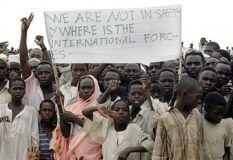Darfuris demand external trials for war crimes suspects
March 11, 2007 (DORTI CAMP) — Angry and dismissive, Darfuris who fled their homes to the relative safety of overcrowded makeshift camps demand Khartoum hand over two war crimes suspects to an international court.
 Standing in the dusty Dorti camp, shielding his eyes from the relentless sun, Mohamed Eid is a world away from the crisp, clean air in The Hague where the International Criminal Court (ICC) prosecutor named the first two Darfur war crimes suspects.
Standing in the dusty Dorti camp, shielding his eyes from the relentless sun, Mohamed Eid is a world away from the crisp, clean air in The Hague where the International Criminal Court (ICC) prosecutor named the first two Darfur war crimes suspects.
But last month’s announcement resonates loudly in remote West Darfur.
“They have to be sent outside for trial,” Eid said of the junior government minister Ahmed Haroun and militia leader Ali Kushayb, who is from el-Geneina.
Eid has been sitting in Dorti camp outside West Darfur’s state capital waiting for peace and security for four years.
Now he’s tired, frustrated and fed up.
He dismissed as unworthy a trial which Sudan’s special Darfur court set up for Kushayb and others, which has been delayed over an appeal by the defendants.
“This is just talk, they’re not serious,” he said.
“How can (President Omar Hassan al-)Bashir try him when Bashir himself is a criminal?”
Mostly non-Arab rebels took up arms in early 2003 accusing the central government of marginalising the arid region. Observers say Khartoum mobilised militia to quell the revolt, but failed to disarm them.
Dorti’s residents say the camp is more like a prison because they do not dare venture out more than a kilometre for fear of attack.
The roads of West Darfur are full of armed militias, bandits and rebels from both Sudan and neighbouring Chad, which is also in the throes of an insurgency in its east.
ETHNIC DIVIDE
The world’s largest aid operation has been attacked a number of times on the roads, leaving large areas along the border out of reach of their assistance.
Abdel Aziz Yehya, 35, who has also languished in Dorti for four years, said since the aid operation arrived in 2004, there has been food and healthcare.
But resources are stretched for the camp’s 9,000 residents and the new arrivals who find their way to shelter there.
Most homes are made from straw woven together and, if residents are lucky, some plastic sheeting to shield them from the heavy rains each year.
Experts estimate 200,000 people have been killed in four years of war in Darfur. Washington calls the rape, pillage and killing genocide, a charge Khartoum rejects and European governments are reluctant to use.
There have been other wars in Darfur’s history in the late 1990s and in the 1980s, mostly between nomadic and farming tribes over scarce resources in this region afflicted by desertification. But Dorti’s residents said this war was different.
“This time the government is involved with Antonovs and helicopters. This never happened in the past,” said Yehya.
“They don’t want these black people here, they take the side of the Arabs because they themselves are Arab.”
Darfur’s conflict did not begin as an ethnic war between all Arabs and non-Arabs. Some non-Arabs joined the government and some Arabs were fighting alongside the rebels. Other tribes refused to fight at all.
But as the conflict raged more and more tribes were pulled into the fighting in region awash with arms and a culture of impunity.
Ethnic lines were drawn. Now the 2.5 million driven into camps like Dorti are almost entirely from non-Arab tribes.
(Reuters)
